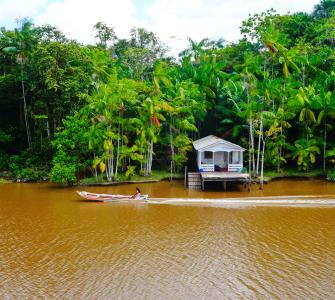Amapá state in northern Brazil has the lowest rates of deforestation in the country, at an estimated 2% of its total territory. Amapá therefore plays a critical role in providing ecosystem services to both the local community through the provision of essential resources like food and water, as well as to Brazil and the international community through carbon sequestration, climate regulation, and nutrient cycling.
Incentive policies designed to protect these ecosystem services and promote conservation of the standing forest value the role local communities play in protecting conserved lands, now and for future generations.
Conservation Strategy Fund (CSF), BVRio (Bolsa Verde do Rio de Janeiro) and Ecosecurities, in partnership with the Amapá State Secretariat for the Environment (SEMA), provided inputs to support the development of a state-level economic incentive policy to maintain environmental services called SECISA (Sistema Estadual de Clima e Incentivos aos Serviços Ambientais do Amapá, State System of Climate and Incentives for Environmental Services in Amapá).
CSF analyzed technical information and data from other states, such as Mato Grosso and Acre, and developed a set of recommendations and guidelines for Amapá to support SECISA. CSF also developed a proposal of the necessary legal framework for the implementation of SECISA and its action plan and held a workshop for public agency managers covering environmental economics, economic valuation, and funding sources. As a result of these joint efforts, in August 2020, SEMA began the process of drafting legislation for SECISA.
This project was conducted in partnership with BVRio and EcoSecurities as part of a project implemented by Conservation International funded by UNDP.
Photo: Amazon River, Brazil
Photo Credit: otorongo/Shutterstock.com

